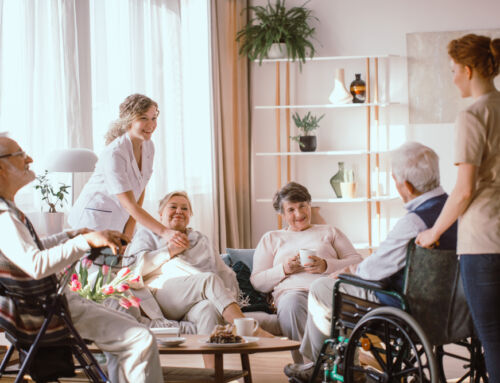“When I was a boy and I would see scary things in the news, my mother would say to me, ‘Look for the helpers. You will always find people who are helping.’”
— Fred Rogers (a.k.a., Mr. Rogers)
There is plenty of bad news to go around lately. From news updates on COVID-19 to stories about natural disasters and political unrest, it can be tough to find much cause for optimism. However, there is always good happening in our world, as this quote from Mr. Rogers reminds us.
One way to bring about positive change is by volunteering for causes that are near to our hearts. There are even ways to volunteer “virtually” to ensure you stay safe amid the pandemic. And as several scientific studies note, this type of altruistic kindness may actually offer health benefits to seniors.
>> Related: Making Meaningful Use of Seniors’ Time & Talents
Volunteering can help your health
In a 2009 study, researchers from University of Michigan and Cornell examined the results of several other studies, including a 20-year longitudinal study of 6,928 adults, looking at the health benefits that came with mid-life volunteerism. Specifically, they looked at the impact of environmental volunteerism on people’s physical activity levels, self-reported health, and depression symptoms.
These researchers found that, compared with non-volunteers, people who volunteered for environmental causes had higher levels of physical activity, better self-reported overall health, and fewer depressive symptoms. In fact, environmental volunteers were 2.6 times more likely to meet the Centers for Disease Control (CDC) guidelines for physical activity. Additionally, the researchers discovered that people who participated in any kind of volunteering were 1.8 times more likely to meet this CDC physical activity recommendation.
Other studies have found even more specific ways that kindness and volunteering to help others may benefit seniors’ health.
>> Related: CCRCs Help Seniors Stay Active for a Healthier Life
Lower risk of dementia
A 2014 study suggested that there may be a correlation between volunteering and reduced rates of dementia or other age-related mental decline. This research looked at over 70 other peer-reviewed articles on the benefits of volunteering (as compared to people who do not volunteer their time and talents).
This review found that volunteering in later life is associated with “significant psychosocial, physical, cognitive, and functional benefits for healthy older adults.” There was even evidence that more hours of volunteering may confer even greater benefits.
Lower blood pressure
A novel 2016 study looked at how altruism can impact blood pressure (hypertension) in people age 65 and older. Researchers from University of British Columbia and University of California-Irvine gave one group of hypertensive seniors $40 for three consecutive weeks ($120 total) to spend on themselves and gave another group of hypertensive seniors the same amount to spend on other people.
At the conclusion of the study, the researchers found that the group of study participants who had been tasked with spending the money on others had lower systolic and diastolic blood pressure than the control group that spent the money on themselves. In fact, the benefits were comparable to the benefits of blood pressure-lowering medication or exercise.
Increased happiness
In addition to the evidence that volunteering can lower rates of depression, being kind and helping others may even make you an overall happier person.
Research has suggested that up to 40 percent of our perceived happiness comes from our “intentional activities” — that is to say, the activities that people choose to engage in to fill their days (Lyubomirsky, Sheldon, and Schkade, Pursuing happiness: The architecture of sustainable change, 2005). A 2009 study out of the U.K. found that being kind to others could increase people’s self-reported level of happiness in as little as three days.
>> Related: A Sense of Wellbeing Leads to a Longer Life: How CCRCs Can Help
CCRCs facilitate volunteering
There are numerous ways that seniors can volunteer their time and talents to worthy causes, thus taking advantage of the potential health benefits of kindness. And many retirement communities, such as continuing care retirement communities (CCRCs or life plan communities), help to coordinate such endeavors.
I’ve written before about the wonderful intergenerational programs offered by many CCRCs and other retirement communities — programs that provide mental and physical health benefits to both young and older participants. I’ve also shared details about a community farming program at one CCRC that is growing healthy food to share with the surrounding neighborhoods.
While safety is a top priority amid the pandemic, there are still ways to engage in such programs while maintaining social distance. For example, tutoring and mentoring activities with young people can be done via video conference or FaceTime. And outdoor activities like gardening are considered safe as it is easy to maintain distance from others and there is lots of fresh air circulation.
In addition to these, there are countless other examples of CCRC and other retirement community volunteer programs that enable residents to give of themselves to causes that they find worthwhile — educational, cultural, environmental, socioeconomic, civic, health, and more. Whatever your passion, there is a volunteer opportunity for you!
>> Related: Heart & Soul: Retirees Find New Meaning Through Volunteering
Kindness matters
If you are interested in learning about ways you can volunteer in your community, volunteermatch.org can help you find opportunities by ZIP code and category. You can even find ways to volunteer safely from your home under their “Virtual Volunteering Opportunities” section.
Want a list of simple, everyday ways to show kindness to others? The Random Acts of Kindness Foundation has lists of kindness ideas by category.






